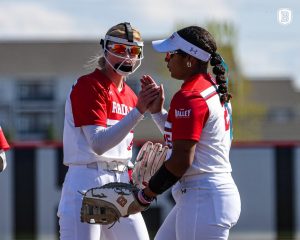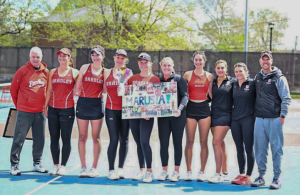In the second installment of our Coaches in College series, we take a look at head soccer coach Jim DeRose’s university days in Vermont.
Soccer in the United States during the late 70s and early 80s wasn’t as popular as it is today. However, in the suburbs of Philadelphia, a rich soccer culture began to emerge.
Thanks to its diverse neighborhoods, the New Jersey side of Philadelphia quickly became a hotspot for young talent to develop.
Despite being surrounded by this culture growing up in Cinnaminson Township, New Jersey, Bradley soccer head coach Jim DeRose didn’t pick up the sport until the age of 13. Soon after, he developed his skills playing for various club teams and eventually his high school team.
“I’ve always joked, probably the hardest team I’ve ever had to make was my high school team,” DeRose said. “Where I grew up, soccer was big … You’re talking about 100 kids playing soccer.”
Upon leaving high school at 17, DeRose knew that as an undersized goalkeeper, he wouldn’t be able to compete at a Division I school. Instead, he chose to attend Johnson State College, now Northern Vermont University.
“I didn’t grow until my late senior year into college,” DeRose said. “From the time I decided [where] to go to school, in April, I grew over four inches … There was a coach up there, who said he’d give me an opportunity.”
DeRose was able to turn the fact that he wasn’t recruited into being a NAIA first-team all-American, New England Player of the Year and the MVP of the Senior Bowl in 1989.
His time in the soccer program at Johnson State didn’t end with his undergraduate degree. As a graduate student, he was able to help his coach Peter Albright bring their team to the 1990 NAIA national tournament.
While much of his time in college was spent around soccer, DeRose also focused on other activities. As an upperclassman, he helped restart Johnson State’s baseball program. Off the field, he majored in health sciences and physical education, giving him a background that he believes made him a better coach today.
“We did a lot of work with exercise physiology, that was a really strong help to be around people like that,” DeRose said.
Back on the field, he saw his team grow from the time he was a freshman. During his time at JSC, the team played in its first playoff game in school history, and eventually, it saw multiple conference championships.
DeRose admits though, even through all of this, he thought of transferring to a Division I school. His father and coach then gave him some of the best advice he’s ever received: Stay.
“It was like, don’t leave something you’re having a great experience [with], because you’re chasing a dream that it has Division I in front of it,” DeRose said.
It was all of these moments, both on and off the field, that convinced him to stay. In fact, he met his wife Robin, a fellow student-athlete, at Johnson State.
As a result of going to a small school, DeRose continues to be a supporter of the NAIA and Division III experience today.
“It was just an immersion, it was just a very fun place to be a part of,” DeRose said. “It gave me a chance to do more than just play soccer.”
DeRose went on to play professionally and coach at other schools, before becoming the youngest head soccer coach in Division I during the 1996 season at Bradley.
While it has been a long road since his time at Johnson State, at Bradley he now has 25 seasons, three Missouri Valley Conference Tournament titles and seven NCAA Tournament appearances under his belt.




